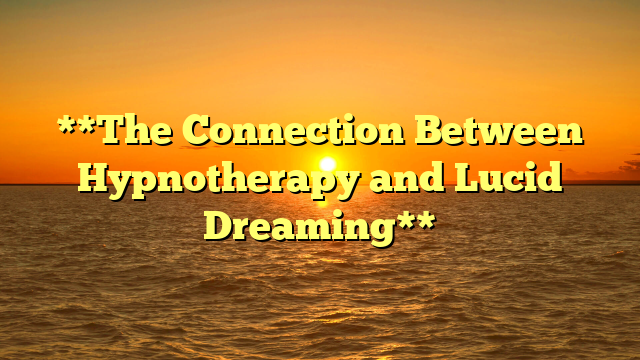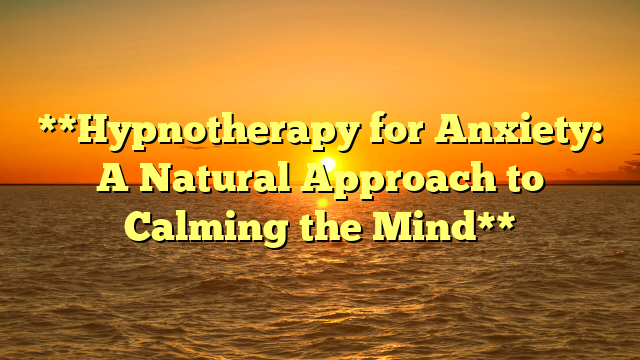
Lucid dreaming, the phenomenon where individuals are aware that they are dreaming and can sometimes control the events in their dreams, has fascinated both the scientific community and the general public for years. While many people experience lucid dreams spontaneously, others seek ways to trigger or enhance this experience. Hypnotherapy, a therapeutic technique that uses hypnosis to access the subconscious mind, has been explored as a potential tool for inducing and improving lucid dreaming experiences. This article will explore the connection between hypnotherapy and lucid dreaming, highlighting how hypnosis can influence dream states and aid individuals in achieving greater control over their dreams.
**Understanding Lucid Dreaming**
Lucid dreaming occurs when a person becomes conscious during a dream, realizing that they are in a dream state while the dream is still ongoing. During this time, some dreamers may gain the ability to manipulate the dream’s content, such as flying, interacting with dream characters, or changing the environment. Lucid dreams can range from brief moments of awareness to full control over the dream, and the experience can vary widely from person to person.
Research suggests that lucid dreaming can have several benefits, including improved problem-solving skills, enhanced creativity, and even therapeutic applications, such as overcoming nightmares or addressing trauma. However, for many, lucid dreaming does not occur naturally, or it may be difficult to maintain awareness throughout the dream. This is where hypnotherapy can play a significant role.
**The Role of Hypnotherapy in Lucid Dreaming**
Hypnotherapy involves guiding an individual into a deeply relaxed state where they can access their subconscious mind. In this trance-like state, individuals are more open to suggestions and can work through various mental, emotional, and behavioral issues. Because both hypnosis and lucid dreaming involve altered states of consciousness, there are several ways in which hypnotherapy can influence lucid dreaming.
**1. Increasing Dream Awareness**
One of the primary goals of hypnotherapy for lucid dreaming is to help individuals increase their awareness during sleep. Through guided suggestions, hypnotherapists can train individuals to recognize when they are dreaming. This can be achieved by employing techniques that help the individual become more attuned to their dream state. Hypnotherapists might suggest that the individual performs certain reality checks during the day, such as asking themselves, “Am I dreaming?” These checks can carry over into the dream state, making it more likely that the person will realize they are dreaming while still asleep.
**2. Enhancing Control Over Dreams**
Once an individual has achieved the awareness that they are dreaming, hypnotherapy can also help them gain greater control over the dream. Hypnotherapists can use visualization and suggestion techniques to help individuals practice controlling their dreams while they are awake, which can then be translated into the dream world. For example, a hypnotherapist might guide a person through a series of exercises where they imagine being in a specific dream scenario and consciously influencing the dream’s outcome. These exercises can help strengthen the individual’s ability to control their dreams once they achieve lucidity.
**3. Reprogramming bayar 4d **
For some people, the ability to lucid dream is hindered by subconscious beliefs or fears, such as doubts about their ability to control the dream or anxiety about the unknown aspects of the dream state. Hypnotherapy can be used to reprogram these limiting beliefs and replace them with more empowering thoughts. For example, a hypnotherapist might suggest that the individual is fully capable of having lucid dreams and that they can confidently explore and control their dream world. By addressing these subconscious barriers, hypnotherapy can increase the likelihood of successful lucid dreaming experiences.
**4. Reducing Nightmares and Sleep Disturbances**
Hypnotherapy is also commonly used to help individuals overcome nightmares, night terrors, or other sleep disturbances. In the context of lucid dreaming, hypnotherapy can be particularly beneficial for people who experience frequent nightmares or distressing dreams. Through hypnosis, individuals can be taught to recognize when they are in a nightmare and then take control of the situation. This can help them transform the nightmare into a more positive or neutral experience. Additionally, hypnotherapy can reduce anxiety or fear around sleep, which may improve the overall quality of sleep and the likelihood of experiencing lucid dreams.
**Benefits of Using Hypnotherapy for Lucid Dreaming**
The integration of hypnotherapy into lucid dreaming practices offers several potential benefits. Some of the key advantages include:
– **Increased Dream Control:** Hypnotherapy can help individuals gain greater mastery over their dreams, allowing them to explore their subconscious mind, solve problems, or experience personal growth through lucid dreaming.
– **Enhanced Creativity:** Lucid dreaming is often linked to enhanced creativity, as dreamers can use the dream state to explore new ideas and possibilities. Hypnotherapy can help individuals tap into this creative potential by training them to consciously interact with their dreams.
– **Emotional Healing:** Lucid dreaming can be used as a tool for emotional processing and healing. Hypnotherapy can guide individuals to confront unresolved emotions or past traumas within the safe space of a dream, facilitating personal growth and emotional release.
– **Improved Sleep Quality:** By addressing issues such as nightmares or anxiety related to sleep, hypnotherapy can improve overall sleep quality, making it easier for individuals to enter a state conducive to lucid dreaming.
Hypnotherapy and lucid dreaming share a unique connection, as both involve altered states of consciousness that can be harnessed for personal growth, healing, and creativity. Through hypnosis, individuals can increase their awareness in the dream state, gain control over their dreams, and address subconscious barriers that may be hindering their ability to lucid dream. By combining hypnotherapy techniques with the practice of lucid dreaming, individuals can unlock the potential for deeper self-exploration, emotional healing, and enhanced creativity. Whether seeking to reduce nightmares, explore the subconscious mind, or simply enjoy a more vivid and controlled dreaming experience, hypnotherapy offers a valuable tool for those interested in lucid dreaming.




